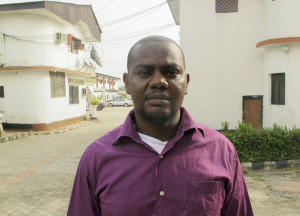A Nigerian ship’s cook has described how he spent more than two days under the ocean last month when his vessel shipwrecked. Breathing inside a small air bubble, he miraculously survived.
The Jascon-4, a small tugboat contracted by the US energy firm Chevron, made headlines last month when it capsized twenty miles off the coast of Nigeria and sank thirty metres underwater. Of the ship’s crew of twelve, ten are known to have drowned and one is missing. One survivor was found.
That man, 29-year old Harrison Okene, has now described his sixty-hour ordeal trapped in the ship’s wreck. Speaking to Reuters in his hometown of Warri, Okene explained that he survived by breathing inside a four foot high bubble of air in the tiny toilet the ship, until two South African divers eventually came to rescue him.
“I was there in the water in total darkness just thinking it’s the end. I kept thinking the water was going to fill up the room but it did not… I was so hungry but mostly so, so thirsty. The salt water took the skin off my tongue.”
Okene said he was in the toilet as the tugboat began to capsize in the early hours of 26 May.
“As I was coming out of the toilet it was pitch black so we were trying to link our way out… Three guys were in front of me and suddenly water rushed in full force. I saw the first one, the second one, the third one just washed away. I knew these guys were dead”.
Okene was swept by surging water into another, four foot square toilet. Here, he held on to the overturned sink to keep his head out of the water.
“I was very, very cold and it was black. I couldn’t see anything,” said Okene. “But I could perceive the dead bodies of my crew were nearby. I could smell them. The fish came in and began eating the bodies. I could hear the sound. It was horror.”
Finally, on the afternoon of 28 May, Okene heard the team of divers that had been sent by Chevron and the ship’s owners, West African Ventures, to search for the bodies of the crew.
“I heard a sound of a hammer hitting the vessel. Boom, boom, boom. I swam down and found a water dispenser. I pulled the water filter and I hammered the side of the vessel hoping someone would hear me. Then the diver must have heard a sound.”
As a diver broke into the ship, Okene says he “went into the water and tapped him. I was waving my hands and he was shocked.”
The diving team fitted Okene with an oxygen mask and diving suit and brought him to the surface that evening. There he was required to spend a further sixty hours in a decompression chamber: immediate exposure to the outside air would have killed him.
Okene claims it was his two days of praying when he was trapped in the toilet that saved him from drowning. “I don’t know what stopped the water from filling that room,” he said. “I was calling on God. He did it.”
Nonetheless, Okene is still understandably troubled by the experience, and doubts whether he will return to sea again.
“When I am at home sometimes it feels like the bed I am sleeping in is sinking. I think I’m still in the sea again. I jump up and I scream.”









